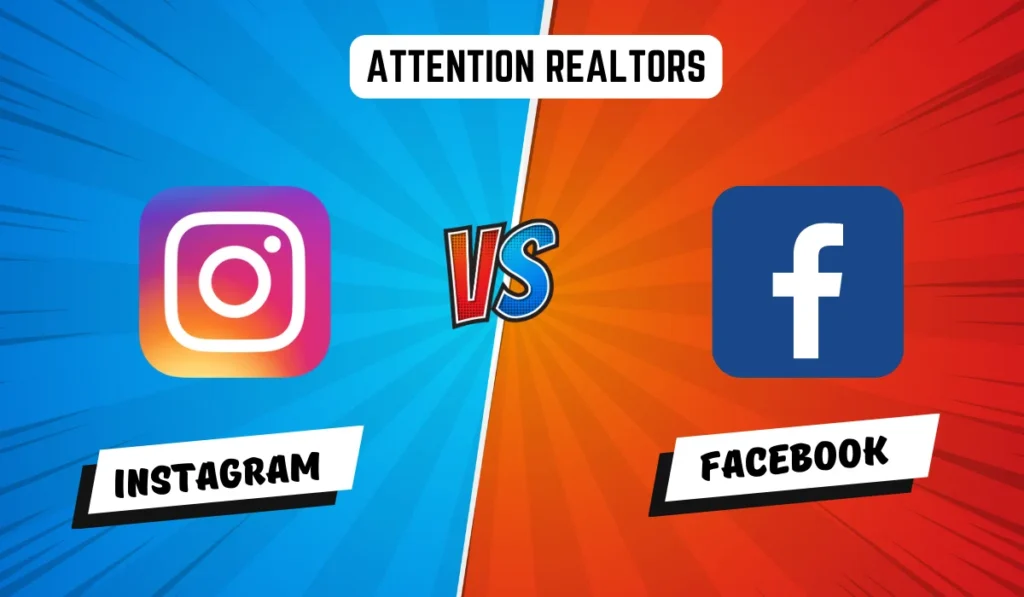With respect to real estate marketing, choosing the right social media platform is pivotal. Realtors navigate a complex landscape where Instagram and Facebook stand out as prominent contenders.
Each platform offers unique advantages and challenges. In this comprehensive guide, we delve deep into the realms of Instagram and Facebook, unraveling the intricacies that make one better suited for realtors than the other.
For a better understanding about how to post effective contents on social media please read my blog Grow Your Brand: 14 Social Media Real Estate Content Hacks and do let me know if it helped you.
Instagram vs. Facebook: Which is Better for Realtors?
In this section, we’ll compare Instagram and Facebook, shedding light on their distinct features and benefits for real estate professionals.
Instagram: A Visual Showcase for Realtors
Instagram, with its visually-driven interface, emerges as a powerful tool for real estate professionals. In the realm of real estate, a picture truly is worth a thousand words. Instagram capitalizes on this notion, allowing realtors to transform properties into captivating visual stories. Here’s how Instagram serves as a remarkable visual showcase for realtors:
1. Immersive Property Displays
On Instagram, realtors can display properties in their full visual glory. High-resolution images capture intricate details, allowing potential buyers to virtually walk through a property. From the elegant architecture to the cozy corners, every aspect can be showcased, creating a sense of immersion that is unparalleled.
2. Engaging Videos
Beyond static images, Instagram enables realtors to share engaging videos. These videos can include virtual property tours, providing viewers with a comprehensive understanding of the space. Videos also allow realtors to add a personal touch, narrating the story behind the property and establishing an emotional connection with potential buyers.
3. Instagram Stories and Reels
Instagram’s features like Stories and Reels offer dynamic ways to present properties. Realtors can create interactive content, such as 24-hour property showcases in Stories. Reels, with their short, engaging format, are perfect for highlighting key features of a property in a fun and attention-grabbing manner.
These features enhance visibility and ensure properties remain in the minds of viewers.
4. Behind-the-Scenes Insights
Instagram allows realtors to humanize their brand by sharing behind-the-scenes glimpses. This could include showcasing the process of preparing a property for sale, introducing team members, or revealing the day-to-day activities of the real estate agency.
Such content builds trust and authenticity, crucial factors in the real estate industry.
5. Building a Unique Brand Identity
Instagram serves as a platform for realtors to craft a unique brand identity. Through consistent visual aesthetics, realtors can establish a recognizable presence. A well-curated Instagram feed with cohesive themes and colors reflects professionalism and attention to detail, qualities that resonate positively with potential clients.
By harnessing the platform’s visual appeal, real estate professionals can create an impactful online presence, attracting potential buyers and leaving a lasting impression. Through stunning visuals and strategic storytelling, Instagram becomes not just a social media platform, but a dynamic showcase for realtors to shine in the digital landscape.
Facebook: Building Realtor Communities
Contrastingly, Facebook stands as a hub for building communities. Realtors can leverage Facebook Groups to establish a network of potential clients, sharing valuable insights and property updates.
The platform’s Marketplace feature facilitates direct property listings, reaching a broader audience. Moreover, Facebook’s targeted advertising tools empower realtors to tailor their marketing campaigns, ensuring they reach the right demographics.
Here’s how Facebook serves as an instrumental tool for realtors in creating and nurturing vibrant communities:
1. Facebook Groups: Cultivating Connections
Facebook Groups act as virtual meeting places where individuals with similar interests, in this case, real estate, gather to share insights and engage in discussions. Realtors can create dedicated Groups centered around specific topics like local real estate trends, home buying tips, or investment strategies. These Groups serve as hubs of knowledge, allowing realtors to position themselves as authorities in their field.
2. Networking Opportunities
Within Facebook Groups, realtors can connect with other industry professionals, potential clients, and even collaborate with complementary businesses such as mortgage brokers or interior designers. Networking in these online spaces opens doors to partnerships, referrals, and valuable advice. By actively participating in discussions, realtors can showcase their expertise and build trust among community members.
3. Direct Engagement with Potential Clients
Facebook provides a platform for realtors to engage directly with potential clients. Through Groups and business pages, real estate professionals can address queries, provide expert advice, and share relevant content. Regular engagement establishes rapport and positions realtors as approachable experts, making potential clients more comfortable reaching out for real estate services.
4. Showcase Property Listings
Facebook allows realtors to showcase property listings directly on their business pages. With detailed descriptions, high-quality images, and virtual tours, real estate agents can attract potential buyers. The platform’s wide reach ensures that property listings are visible to a vast audience, increasing the chances of finding the right buyer for a property.
5. Targeted Advertising and Analytics
Facebook’s advertising tools are invaluable for realtors. Through targeted ads, real estate professionals can reach specific demographics based on location, interests, and behaviors. This precision ensures that marketing efforts are focused on the most relevant audience, maximizing their impact. Additionally, Facebook provides detailed analytics, allowing realtors to assess the performance of their posts and ads, enabling data-driven decision-making.
6. Community Engagement Events
Facebook Events feature enables realtors to organize virtual seminars, webinars, or live Q&A sessions within their Groups. These events not only provide valuable information to community members but also position the hosting realtor as an industry expert. Interactive sessions foster engagement and allow realtors to address concerns and questions directly, building credibility and trust.
to summarize, Facebook empowers real estate professionals to create communities that extend beyond traditional client-realtor relationships.
By leveraging Groups, networking opportunities, direct engagement, property showcases, targeted advertising, and community events, realtors can build a strong online presence, establish authority, and cultivate relationships that are not only beneficial for their businesses but also enriching for the communities they serve.
Facebook becomes more than just a social media platform; it becomes a thriving ecosystem where realtor communities flourish.
FAQs: Understanding the Nuances
Q: Which platform is more cost-effective for real estate advertising?
Instagram’s targeted advertising can be more cost-effective, ensuring your ads reach potential buyers genuinely interested in real estate.
Q: Does Instagram’s visual nature benefit realtors?
Yes, Instagram’s focus on visuals allows realtors to showcase properties aesthetically, creating a lasting impression on potential buyers.
Q: Can Facebook Groups enhance a realtor’s network?
Absolutely, Facebook Groups serve as a platform for realtors to connect, share insights, and establish a community, fostering valuable relationships.
Q: How does Facebook’s Marketplace benefit real estate agents?
Facebook Marketplace expands the reach of property listings, making it accessible to a wide audience, increasing the chances of finding potential buyers.
Q: Are Instagram ads more engaging than Facebook ads?
Instagram’s visually appealing format often leads to higher engagement rates, making it an excellent choice for realtors aiming to capture attention.
Q: Which platform offers better analytics for real estate marketing?
Both platforms provide robust analytics tools, allowing realtors to track the performance of their listings, enabling data-driven marketing strategies.
Conclusion
In the world of social media, both Instagram and Facebook offer distinct advantages for realtors. Instagram’s visual allure provides a captivating platform for showcasing properties, while Facebook’s community-building features facilitate networking and direct listings. When choosing between Instagram and Facebook, realtors must assess their specific goals and target audience, ensuring they select the platform aligning with their objectives.
Please follow our social media pages to get notified about exciting discounts and offers.

